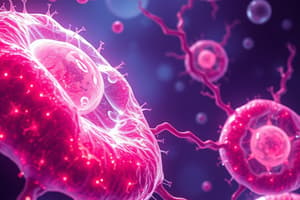Podcast
Questions and Answers
What distinguishes unipotent cells from non-stem cells?
What distinguishes unipotent cells from non-stem cells?
- Their capacity for self-renewal. (correct)
- Their inability to produce any mature cells.
- Their ability to differentiate into multiple cell types.
- Their origin from embryonic tissues.
Which type of stem cell is derived from the blastocyst stage of development?
Which type of stem cell is derived from the blastocyst stage of development?
- Multipotent stem cells
- Embryonic stem cells (correct)
- Amniotic fluid stem cells
- Induced pluripotent stem cells
Which of the following correctly describes multipotent hematopoietic stem cells?
Which of the following correctly describes multipotent hematopoietic stem cells?
- They produce cells of a closely-related family, like blood cells. (correct)
- They can only produce red blood cells.
- They cannot self-renew.
- They can differentiate into any cell type in the body.
What process is used to create induced pluripotent stem cells from adult somatic cells?
What process is used to create induced pluripotent stem cells from adult somatic cells?
Which type of stem cell is typically considered as multipotent, capable of producing a limited number of cell types?
Which type of stem cell is typically considered as multipotent, capable of producing a limited number of cell types?
What describes the process of cell differentiation?
What describes the process of cell differentiation?
What is one key property of stem cells?
What is one key property of stem cells?
Which type of stem cell has the potential to form a complete organism?
Which type of stem cell has the potential to form a complete organism?
Which of the following best describes pluripotent stem cells?
Which of the following best describes pluripotent stem cells?
What term describes the ability of stem cells to produce a stem cell and a progenitor cell?
What term describes the ability of stem cells to produce a stem cell and a progenitor cell?
Which of the following statements is true about the cells in adult animals?
Which of the following statements is true about the cells in adult animals?
What best describes the potency of stem cells?
What best describes the potency of stem cells?
Which type of stem cells are derived from the inner cell mass of the blastocyst?
Which type of stem cells are derived from the inner cell mass of the blastocyst?
Flashcards are hidden until you start studying
Study Notes
Cell Proliferation
- Adult cells have different proliferation rates, some actively divide while others are arrested in the G0 phase
Cell Differentiation
- Unspecialized cells acquire specific structural and functional characteristics during differentiation
- This process leads to the development of specialized cells, tissues, and organs in mature organisms
Stem Cells
- Early development involves rapid proliferation and differentiation of embryonic cells
- Stem cells retain the ability to divide and produce differentiated cell types
Stem Cell Properties
- Self-renewal: Stem cells maintain their undifferentiated state while dividing
- Potency: Stem cells have the capacity to differentiate into multiple cell lineages
Types of Stem Cells
- Totipotent stem cells: Found in early embryos, can generate all cell types and tissues
- Pluripotent stem cells: Derived from the inner cell mass of the blastocyst, can differentiate into the three primary germ layers (ectoderm, mesoderm, endoderm)
- Multipotent stem cells: Can produce cells of a closely related family, like hematopoietic stem cells
- Unipotent cells: Can produce only one type of mature cell but retain self-renewal properties
Sources of Stem Cells
- Embryonic stem cells: Pluripotent stem cells derived from blastocysts, ethical restrictions limit their use
- Adult stem cells: Multipotent stem cells found in adult tissues, can only produce a limited number of cell types
- Amniotic fluid stem cells: Multipotent stem cells
- Umbilical cord blood stem cells: Considered pluripotent
- Induced pluripotent stem cells: Created by reprogramming adult somatic cells to acquire embryonic stem cell properties
Therapeutic Applications of Stem Cells
- Stem cells hold potential for treating various diseases and injuries by:
- Replacing damaged or lost cells
- Regenerating tissues
- Repairing organs
- Developing potential treatments for conditions like:
- Cancer
- Neurological disorders
- Heart disease
- Diabetes
- Spinal cord injuries
Studying That Suits You
Use AI to generate personalized quizzes and flashcards to suit your learning preferences.




